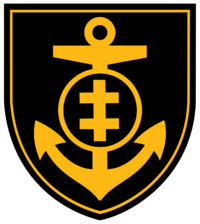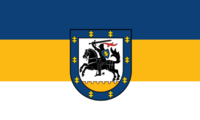Baltican Navy
| Baltican Naval Force Baltijos karinės jūrų pajėgos | |
|---|---|
 | |
| Active | c. 17th century AD - Initial Foundation |
| Country | |
| Branch | Navy |
| Role | Naval warfare, Patrolling |
| Size | 8,331 active duty personnel 20 ships |
| Part of | Baltican Armed Forces |
| Garrison/HQ | Port Svoyev |
| Patron | Saint Rein |
| Motto(s) | "Sons of the Sea, brothers of the free" |
| Colors | Golden Yellow, Prussian Blue |
| Commanders | |
| Head Admiral | Yvo Falk |
| Insignia | |
| Ensign |  |
| Naval Jack |  |
The Baltican Navy is the naval branch of the Baltican Armed Forces. The Baltican navy was once a vital component of Balticas ability to export its power across the Amber Lake, and has historically provided the Baltican Dolch uncontested control over most of Southern Baltica. It was formally established in 1642, becoming an official separate branch of the then Royal Army. After the first Baltican civil war, the Royal Navy was replaced by the Peoples Republic Navy. In the aftermath of the second Baltican Civil war the Peoples Republic Navy was reformed into the Baltican Naval Force.
History
Although the Baltican Navy was only officially formed in 1642, for over three centuries a crude navy operated in tandem with the Order of Baltishtin and then later the Kingdom of Baltica. Various rivercraft would often flow between large rivers like the Balandeli and Goja, often getting into fights with lesser Baltican tribes and their meagre fishing boats. However, the primary goal and objective of the not yet established navy were to maintain control of the Amber Lake and protect valuable trade routes such as the routes going from the Amber Isles to the mainland. Because the Navy was so decentralized, it would often struggle to perform, and infighting was quite common. Piracy was rampant outside of established trade routes, and fishing boats would be subject so constant pillaging. This lack of order would eventually lead to the formation of the Baltican Royal Navy.
The 17th century saw trade in the Amber Lake explode, as the rise of many new nations (Particularly Estimeria) saw the rise of Baltican goods; primarily lumber and grains. However, as trade increased the amount of piracy in the lake exploded exponentially, to the point where it was beginning to impact the economy of both the Kingdom of Baltica, and other powers around the lake. To combat this piracy, King Wilmar II would formally sign a decree which oversaw the creation of a Baltican Royal Navy. Using lumber from the recently integrated region of Kretia, King Wilmar financed the creation of two fleets, which he then sent to the Pebble Isles (Which had been under Pirate control for two decades). His new fleed would be victorious, and once again the Amber Lake trade routes would be stable. This would also lead to the full integration of the Amber Isles (Which Included the islands of St Casimir, St Bunno and the Pebble Isles) into the rest of the Kingdom, with all three becoming private estates of the Royal Family.
After the first Baltican Civil war, what remained of the Royal Navy was re-organised into the Peoples Republic Navy. President and dictator Algridas Benis would end up dedicating a significant amount of money towards the Navy, not because of any actual need, but simply because he could. Under his reign, the Baltican navy grew to be one of the largest in Central Argis, despite being almost entirely landlocked within the Amber Lake. Additionally, the development of Submarines and Battleships was criticized for being quite wasteful as they would never see any use in the Amber Lake. This waste would see the Baltican Navy grow in size, but its functionality stagnate, whilst technological development would also similarly stagnate as most financing would end up going to the construction of more vessels, rather than keeping up with the times.
During the Second Baltican Civil War most of the navy fell into the hands of Admiral Stefan Huber, who took the navy and beached most of it in the Amber Isles, where he became the de facto head of state. Former Admiral Gerd Stube would end up seizing a Corvette and using it to lead a raid against the city of Diems and other Dokestven ports. By July of 2022, most of the various navy factions would seize operations as they would run out of heavy fuel, as did most of Baltica during the war. After the Amber Resolution, all former Navy Vessels owned by the Amber Isles would end up transferring their ships back to the Central Baltican Government.
Current Fleet
| Name | Picture | Origin | Class | Type | Built | Entered service (LNF) | Notes |
|---|---|---|---|---|---|---|---|
| Corvette Squadron | |||||||
| N42 Republika | 
|
Flower-class corvette | Corvette Naval Ship | 1977 | 1980 | Current Capital Ship of the Baltican Navy. | |